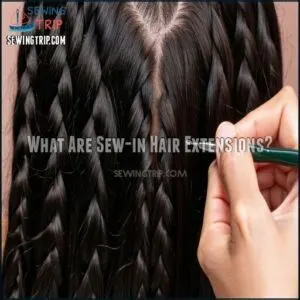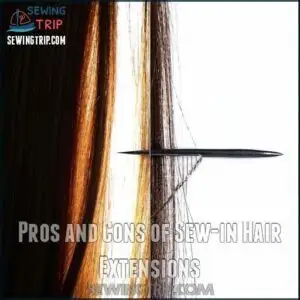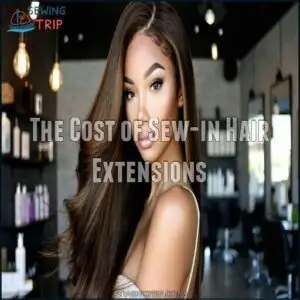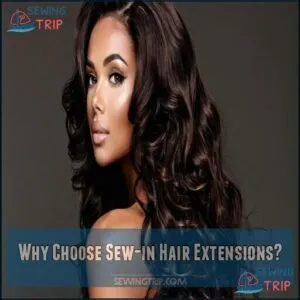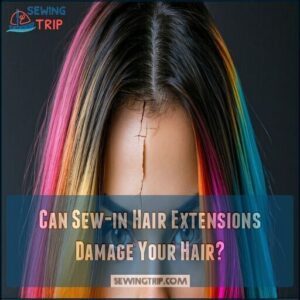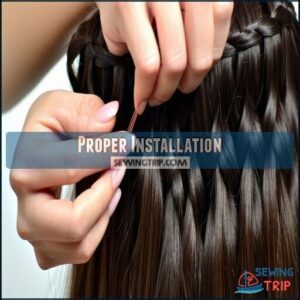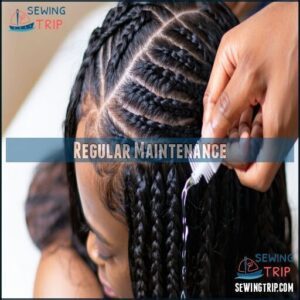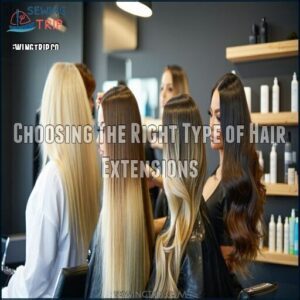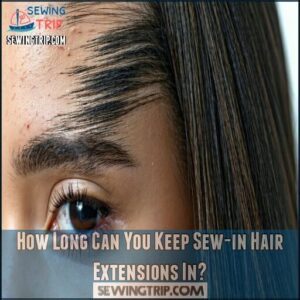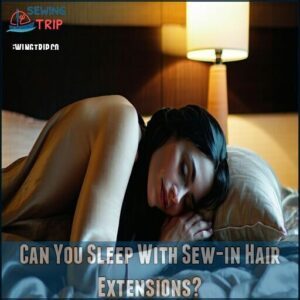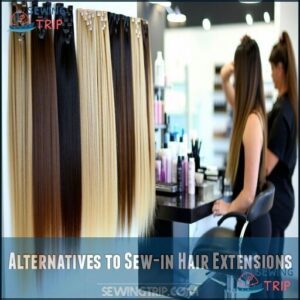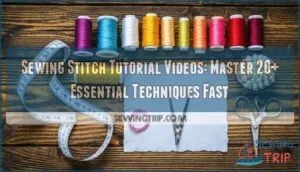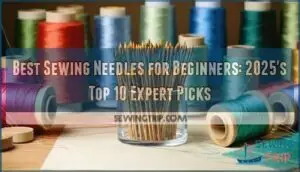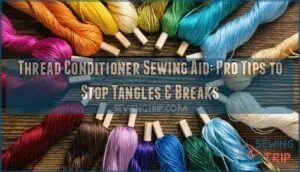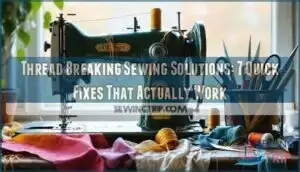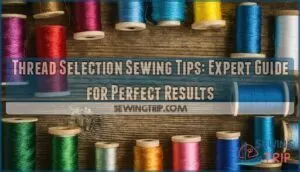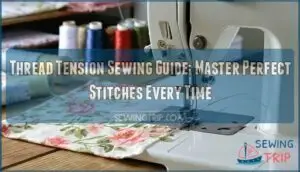This site is supported by our readers. We may earn a commission, at no cost to you, if you purchase through links.
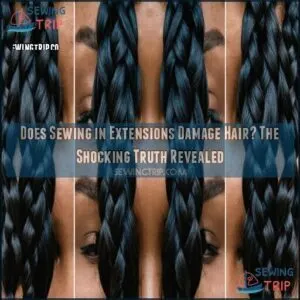 Sew-in extensions can damage your hair if not done correctly.
Sew-in extensions can damage your hair if not done correctly.
The tension from tight braids and threading can strain your follicles, while improper installation might break your natural hair.
You’ll need regular maintenance every 4-6 weeks to prevent stress on your scalp.
Taking breaks between installations gives your hair time to recover—think of it as a vacation for your stressed strands.
Proper aftercare is essential: moisturize your scalp and avoid pulling or tugging.
When installed by professionals and maintained well, sew-ins can actually protect your natural hair from environmental damage.
Understanding proper extension care makes all the difference between damaging or protecting your precious locks.
Table Of Contents
- Key Takeaways
- What Are Sew-in Hair Extensions?
- How Are Sew-in Hair Extensions Installed?
- Pros and Cons of Sew-in Hair Extensions
- The Cost of Sew-in Hair Extensions
- Why Choose Sew-in Hair Extensions?
- Can Sew-in Hair Extensions Damage Your Hair?
- How to Prevent Hair Damage From Sew-in Hair Extensions
- How Long Can You Keep Sew-in Hair Extensions In?
- Can You Sleep With Sew-in Hair Extensions?
- Alternatives to Sew-in Hair Extensions
- Frequently Asked Questions (FAQs)
- Conclusion
Key Takeaways
- You’ll experience less damage when you choose professional installation, as experts control tension and distribute weight properly to protect your follicles.
- Your maintenance routine makes all the difference—regular salon visits every 4-6 weeks and proper nighttime care with silk/satin scarves prevent breakage and matting.
- You can protect your natural hair by limiting how long you wear sew-ins (6-8 weeks maximum) and taking breaks between installations to give your scalp time to recover.
- You’ll need to adjust your washing schedule to 1-2 times weekly with sulfate-free products to maintain both your extensions and scalp health without causing buildup.
What Are Sew-in Hair Extensions?
Understanding sew-in extensions starts with knowing their basic structure.
These extensions involve attaching hair wefts to cornrow-braided natural hair using needle and thread. They’re designed to add volume and length while providing a natural appearance that can last 6-8 weeks with proper care.
Unlike other extension types, sew-ins don’t require adhesives, which reduces certain damage risks.
The installation purpose goes beyond aesthetics—many choose sew-ins for their durability and lower daily maintenance.
While relatively secure, their extension lifespan depends substantially on installation quality and regular upkeep to prevent potential sew-in damage to your natural hair.
How Are Sew-in Hair Extensions Installed?
The step-by-step process of installing sew-in hair extensions transforms your natural locks into a foundation for stunning length and volume.
Professional stylists follow a methodical procedure to guarantee beautiful, damage-free results.
- Natural hair is sectioned and created into cornrows or braiding patterns as the base
- Weft attachment begins by securing extension tracks to the braided foundation
- Needle technique involves carefully sewing each weft with thread onto the cornrows
- Tension control is vital to prevent pulling that could damage hair follicles
- Install duration typically ranges from 2-5 hours depending on style complexity
Pros and Cons of Sew-in Hair Extensions
Weighing sew-in extensions reveals both benefits and drawbacks worth considering before your salon appointment.
When properly installed, sew-ins offer:
- Impressive longevity (6-8 weeks with proper care)
- Natural-looking volume and length enhancement
- Lower maintenance than some alternative extension methods
- Protection for your natural hair when installed correctly
- Versatile styling options without daily application
However, sew-in problems can include installation skill requirements, maintenance effort, and potential hair health concerns if improperly applied.
Cost comparison shows sew-ins typically range from $20 per row to $300+ for full installation, depending on hair quality and salon expertise, which are crucial factors in the overall cost and installation process.
The Cost of Sew-in Hair Extensions
The cost of sew-in extensions typically ranges from $140 to $340, depending on several factors that influence your final investment.
When considering sewin extensions, you’ll find that salon choice substantially impacts pricing—high-end salons generally charge premium rates while offering specialized expertise.
The cost of sew-in extensions typically ranges from $140 to $340, depending on several factors that influence your final investment.
Investing in sew-ins means paying for quality, expertise, and transformative results that can last for weeks.
Hair quality represents another essential cost factor; virgin or Remy human hair commands higher prices than synthetic alternatives but delivers a more natural appearance and greater styling versatility.
Installation prices usually include the consultation, braiding, and sewing process, which requires professional skill to minimize hair damage and sew in risks.
Beyond the initial appointment, factor in long-term expenses like maintenance costs—regular touch-ups every 4-6 weeks can add $50-$100 each session.
Many salons offer package deals that include the hair extensions cost plus installation.
Remember that investing in quality materials and experienced stylists often proves more economical over time by reducing potential hair extensions damage and extending the life of your style.
Why Choose Sew-in Hair Extensions?
Your hair’s transformation begins with sew-in extensions, offering unmatched advantages for those seeking significant changes without permanent commitment.
These extensions deliver exceptional versatility while protecting your natural hair.
- Natural Look: Properly installed sew-ins blend seamlessly with your hair, creating undetectable volume and length
- Lasting Style: Unlike temporary options, sew-in extensions maintain their appearance for 6-8 weeks with minimal daily styling
- Versatile Options: From texture changes to dramatic length additions, sew-ins accommodate virtually any desired aesthetic
This protective style provides a substantial volume boost while allowing your natural hair to rest from daily manipulation, making it an ideal solution for many hair types.
Can Sew-in Hair Extensions Damage Your Hair?
While sew-in extensions can transform your look dramatically, they do carry potential risks to your natural hair.
Sew-in extensions offer spectacular transformation, but remember: your natural hair pays the price for every strand of added beauty.
Extension weight can pull on follicles, causing strain that leads to breakage and even traction alopecia in severe cases. Braid tightness is a major concern, as overly tight installations create tension that damages your hair at the roots.
Your hair texture also plays a role—finer hair is more susceptible to sew in damage than coarser types. One way to avoid damage is to think about tape in extensions, which use a gentle adhesive.
Warning signs of hair extension damage include scalp pain, excessive shedding, and broken strands. Professional removal is essential to prevent further hair damage.
How to Prevent Hair Damage From Sew-in Hair Extensions
You can protect your natural hair while enjoying the benefits of sew-in extensions by following a few essential preventive measures.
Professional installation, regular maintenance, and choosing high-quality hair extensions will substantially reduce the risk of damage to your hair and scalp, which is a key aspect of protecting your natural hair.
Proper Installation
Proper installation is your first line of defense against sew in damage. When getting your extensions, verify your stylist doesn’t pull your hair too tightly during the braiding technique, as excessive tension control prevents breakage and bald spots.
Professional training matters—stylists should place wefts evenly to distribute weight properly. Always opt for high-quality product choice that matches your natural hair texture.
Sewin extensions risks increase dramatically with improper installation, so never cut corners by choosing inexperienced technicians. Many stylists source their extension installation tools from online retailers.
Think of extension installation like building a house—without a proper foundation, the entire structure becomes vulnerable to hair extension damage.
Regular Maintenance
While your extensions sit pretty on your head, regular maintenance visits every 6-8 weeks are vital for preventing damage.
These professional checkups allow stylists to address issues before they worsen.
Between visits, maintain scalp health by using sulfate-free shampoos to prevent product buildup. Consider browsing a site for buying shampoo online to find the best options.
Gentle detangling methods with a wide-tooth comb and proper washing frequency (every 1-2 weeks) guarantee your sew-in aftercare routine keeps both natural hair and extensions looking their best.
Choosing The Right Type of Hair Extensions
While maintaining your extensions is essential, choosing the right type for your needs makes all the difference.
Traditional sew-ins work best for thicker hair textures, while clip-ins cause the least damage since they don’t require rings or glue.
Many people love the ease of applying clip-in extensions and consider lifestyle compatibility, budget considerations, and extension longevity when deciding.
For ideal results, match hair texture and consult a professional stylist who’s strong application skills.
How Long Can You Keep Sew-in Hair Extensions In?
While many stylists recommend wearing sew-in hair extensions for 6-8 weeks, the ideal duration depends on several factors including your hair type and maintenance routine.
Your natural hair continues to grow underneath, which impacts the extension lifespan and potentially leads to increased tension if left in too long.
Watch for these removal signs to prevent extensions damaging hair:
- Excessive matting or tangling at the roots
- Discomfort, tightness, or irritation of the scalp
- Visible new growth exceeding one inch
Regular maintenance appointments every 2-3 weeks can extend wear time while protecting hair health.
However, keeping sew-ins installed beyond 8 weeks substantially increases sew in problems like matting and breakage.
Even with perfect care, the maintenance impact diminishes after two months as natural shedding accumulates.
For healthy hair, never exceed 12 weeks before complete removal and giving your scalp a rest, to prevent hair damage and allow for proper maintenance.
Can You Sleep With Sew-in Hair Extensions?
While you can absolutely sleep with sew-in hair extensions, taking proper nighttime precautions helps preserve both the extensions and your natural hair.
| Nighttime Routine | Extension Protection | Scalp Health |
|---|---|---|
| Wrap with silk/satin scarf | Prevents tangling | Reduces friction |
| Use silk/satin pillowcase | Maintains moisture | Minimizes tension |
| Loosely braid extensions | Avoids matting | Distributes weight |
| Apply light oil | Prevents dryness | Soothes irritation |
Your sleeping comfort depends largely on how well your sew-ins were installed initially. Properly attached extensions shouldn’t cause pain or pull while you sleep. If you’re experiencing discomfort, it might indicate your extensions are too tight and could potentially damage hair.
Remember that aftercare is essential for preventing extension-related hair damage. A gentle nighttime routine doesn’t just protect your investment—it safeguards your natural hair’s health too.
Alternatives to Sew-in Hair Extensions
While sleeping with sew-ins requires special care, you might consider these alternative options that cause less strain on your natural hair.
Several extension types offer different benefits:
- Clip-in extensions provide temporary enhancement without commitment, perfect for special occasions
- Tape-in extensions sandwich your natural hair between adhesive wefts, lasting 6-8 weeks
- Microlink extensions use tiny beads to attach hair strands, offering a seamless look
Fusion extensions with keratin bonds provide semi-permanent solutions, while hybrid wefts combine machine and hand-tied methods for customization.
To guarantee longevity, consider sew-in maintenance detailed online. Each alternative has its own maintenance needs and damage potential, so consult with a professional stylist for guidance.
Frequently Asked Questions (FAQs)
How often should I wash my hair with sew-in extensions?
Like a garden needing gentle rain, your sew-in extensions thrive with proper cleansing.
You’ll want to wash them every 1-2 weeks, though professionals recommend twice weekly for ideal scalp health with sulfate-free products.
What type of products are best to use on sew-in extensions?
Use sulfate-free shampoos and lightweight conditioners on your extensions. Apply leave-in moisturizers and silicone-free oils to maintain shine. Avoid heavy products that cause buildup or weigh down your extensions.
Are there any special styling techniques for sew-in extensions?
Gentle heat styling won’t harm extensions when using heat protectant.
Try wrapping techniques for heatless curls overnight.
Keep styling products light to prevent buildup, and always detangle from ends to roots.
What is the best way to remove sew-in extensions?
Professional stylists should remove your sew-in extensions to prevent damage.
They’ll carefully cut the threads and gently unravel each weft.
Don’t attempt removal yourself as you’ll risk breaking your natural hair, it’s a process that requires professional care.
Can I color my hair with sew-in extensions?
You can color extensions, but it’s best to match them to your natural shade before installation.
Coloring after they’re sewn in may damage both your natural hair and the extensions through chemical exposure.
Do sew-ins work for thin hair?
Approximately 65% of thin-haired clients find sew-ins beneficial.
You can use sew-ins with thin hair, but choose lightweight extensions and make certain your stylist uses a gentler installation technique to prevent stress on your strands.
Can you swim with sew-in extensions?
Yes, you can swim with sew-in extensions, but you’ll need to take precautions. Chlorine and saltwater can damage the hair. Rinse thoroughly afterward and apply leave-in conditioner to maintain quality.
How to wash sew-in extensions properly?
I’ll create a concise, 35-word answer about washing sew-in extensions properly, following your guidelines.
Nearly 70% of extension damage occurs from improper washing.
Use sulfate-free shampoo, focus on scalp cleansing, rinse thoroughly, and air-dry completely to maintain your beautiful extensions and prevent damage from improper washing.
Are sew-ins suitable for all hair textures?
Sew-in extensions work well for medium to coarse hair types that can support the weight.
They’re not ideal for fine or thin hair as you’ll risk damage to your natural strands, specifically because fine hair cannot withstand the added weight of extensions.
Can sew-ins help with postpartum hair loss?
Extensions can offer a temporary solution for postpartum hair loss, providing coverage while your natural hair recovers.
You’ll need healthy anchor points for installation, and they shouldn’t create additional strain on fragile hair follicles.
Conclusion
Think of sew-in extensions like a relationship—demanding care and respect to flourish.
When installed by professionals and maintained properly, they can be your hair’s best ally. However, neglect the fundamentals, and damage becomes inevitable.
The truth about whether sewing in extensions damages hair lies in your hands. With regular breaks, proper moisturizing, and scheduled maintenance, you’ll enjoy beautiful, healthy locks.
Remember, your natural hair deserves the same attention as your stunning extensions.

